- Home
- J. M. Redmann
Ill Will Page 8
Ill Will Read online
Page 8
I covered my nose with my sleeve, bypassed the kitchen, and headed down the center hall. The house was dark, little light filtering in from outside, the cheap blinds all shut.
The first door I opened was a bathroom, like the kitchen a mess, stains on the toilet and sink I didn’t want to think about. I hastily closed the door.
The next was a study with an old, heavy computer, a large monitor taking up most of the desk. Like the first room, it was dusty, as if no one had used it for a long time. I quickly looked inside the closet in this room, but it only contained stacks of books. A cat could hide anywhere and I didn’t have a flashlight with me. I could only hope that if there was a cat or dog here, the animal would have enough sense—or be desperate enough—to come to me.
There was only one more door.
I opened it.
Like the kitchen and the bathroom, this place was rancid with use, a fetid smell of unclean, unwell. In the dim light it was hard to make out the shapes and lumps of the disorder.
Then I saw a body on the bed. Half-covered, half-out, an emaciated arm clutching the blanket, the other arm falling off the bed into a half light.
I pressed my sleeve harder against my nose to keep out the smell of death.
The hand moved and knocked a pill bottle off the nightstand onto the floor.
That was the noise I had heard. There were several objects scattered on the bare pine planks, a swath of the nightstand empty.
“Reggie?” I said softly, afraid to breathe.
He made a bare gurgle, someone trying to speak, but far beyond it.
I grabbed my cell phone, stepped back into the hallway, into air I could inhale and not retch. I choked out the words to the 911 operator—someone very ill, needed help right away.
Yes, I would stay, I told her.
I folded my phone and was left in the silence and the stench with a man about to die.
I came back to his doorway. “Reggie, help is on the way. They’ll be here in a few minutes. You’ll be okay.”
I had to cover my nose with my sleeve again, afraid I might vomit. I tried to take a step into the room, but couldn’t.
Some deaths are sudden, a flash from life into what’s on the other side. His was not; it was a slow descent into illness, into a body giving up, the bowels letting go, sweat and urine on older sweat and urine, no dignity or grace, disease eating away everything save for a shallow breath and barely beating heart.
“They’ll be here soon,” I said. I didn’t know whether I was talking to him or myself.
I thought to offer him water, to remind us both that he wasn’t a dying animal. But he wasn’t able to reply and I had no way of knowing whether he was capable of drinking.
They’d be here soon with IV fluids, medical people who had the knowledge to save this dying man.
I finally admitted my cowardice and left him. I tried to tell myself I would do him more good by being out front to wave the ambulance in, but I knew the truth. I was starting to gag, my lungs feeling invaded by the rancid smell, and I had to get air that was clean, baptized by sunshine, into my lungs.
Opening his front door, I put one foot out onto the top step, enough to get my head out into the fresh breeze. I could finally take my sleeve away from my face.
I could feel the neighbor who had given me the key looking in my direction, but I pointedly ignored her. If she wanted to know what had happened to him, she should have taken her key and checked. You’re lucky, lady, I silently told her. If I wasn’t ignoring you, I’d be screaming at you. All she’d know would be the arrival of the ambulance.
Time seemed to have stopped. The bright sunshine, the distant hiss of cars passing, a breeze picking up, then falling, nothing to distract me from knowing there was a man in there dying and I could do nothing for him except stand as far away as I could from him.
Then, finally, finally, the faint and growing siren, adding to it the engine, and the solid shape of the ambulance turning the corner, pulling in front. It was followed by a police car.
I quickly stepped into the street to meet them. Our talk was spare, a quick briefing for the EMTs, what I’d found, what they’d find.
Then I crossed the street, out of their way. I was a stranger here, not family, not friend, only here through a thin web of coincidence.
But the police had questions, and they had little to do other than question me.
I told them what had happened, why I was here.
The older one seemed content with my story, but the younger one asked, “Let me see your license.”
I pulled out my wallet and showed it to him. The older woman gave it a quick look, the younger one examined it closely.
“So you came here as a favor to a friend?” he queried after he finally gave me the license back.
I had called Cordelia a friend because this didn’t seem the place to have to explain the homosexual agenda. “Yes, she did a favor for my cousin, so I felt I owed her one,” I told them. I again went over the broken pipe, the rescheduling mess, being as redundant and boring as possible.
The older cop yawned.
The younger cop asked, “Any chance it was foul play?”
A young man doesn’t get medical treatment, gets so sick he almost dies. I would call it foul, but I didn’t think the law did.
But his line of questioning was interrupted by the clattering of the EMTs taking Reginald Banks out of the house.
In the dim light I had barely seen him, a limp shape covered in lumpy sheets and blankets, those emaciated arms. For the first time, I saw his face clearly. In health he would have been a handsome man, high cheekbones, a proud nose, thick, curly hair, an olive skin that put him between races. Even illness could not erase everything he might have been. But the face that flashed by me was hollow and gaunt, the eyes dull, unable or no longer interested in seeing what was around him.
Even the bright sunshine couldn’t keep me from shuddering. He seemed so close to death that part of him was already a ghost.
The younger cop decided to investigate the house for signs of “foul play.” His older—and wiser—partner was content to let him go in. I was even kind enough to give him the key. He could return it to the incurious neighbor.
The older cop and I looked at each other, then she glanced down at her watch. She said softly, “I’ll buy you a beer if he manages to stay in there more than ten minutes.”
He was back out in less than two, retching on the side of the stone steps.
“There was a lot of foul in there,” I muttered.
The older cop retrieved a bottle of water from the squad car and tossed it to her partner. He washed his mouth out three times before swallowing anything.
“We might need to contact you to follow up,” she said, but I could see she didn’t believe that would happen. We exchanged business cards.
“Yeah, there are a few more things we might need to check out,” the younger cop said, attempting to regain his swagger.
From behind his shoulder, the older cop gave me a sad smile.
Reginald Banks would go the hospital; maybe medicine had a miracle for him and he would come back here and that would be the end of it. Or there would be no miracles and his death would be ruled accidental. And that would be the end of it, unless some absent relative decided that they could make money from a malpractice suit.
I headed for my car, vaguely hearing someone call, “Hey, you.” It sounded like the woman who had given me the key. I ignored her. She wasn’t curious enough to call again, or follow me to my car.
I drove away not even knowing where I was going. Home? The office? Somewhere else? Nowhere? I found myself on Orleans Avenue and just stayed on it until I hit City Park, slowing to follow its twisting roads through the leafy trees. Life went on here, people playing tennis, picnicking in the shade, everything green and growing, the abundance of spring.
The opposite of a man dying alone.
I finally wound my way to Esplanade, taking that back almost to the
river before finally deciding to head to my office. I took Dauphine down to the Bywater where my office is. I wanted more of the common, everyday exigencies to fill my time, to create distance from what I had witnessed.
As I was about to put the key in the downstairs door lock, I realized I had neglected to check my surroundings. As Joanne had said, Prejean wasn’t likely to carry out his threat, but that didn’t excuse my inattention. But the street was quiet and silent. I carefully locked the door behind me before heading up the stairs.
I started with cleaning the coffeepot, but that wasn’t demanding enough to keep me from wondering if some of the smell lingered in my clothes. I rummaged in the assortment of clothes I kept here, some for the purpose of changing how I looked, others for times like this, when I could no longer wear what I started out the day in. I found a baggy pair of jeans and a very bright purple LSU sweatshirt.
Cleaning the closet seemed a logical next step. Or next distraction. I arranged the clothing from frothy pink costumes to the sensible jeans and T-shirts, grouping this into clothes that only cases could compel me to wear to sensible, normal clothes appropriate for a sensible, normal lesbian like myself.
After finishing the closet—even dusting the top shelf—I turned to e-mail, then reading news stories online. Distance.
The afternoon passed. I stayed beyond my usual quitting time, temporarily safe in a cocoon of these enclosed walls, the world compressed to the size of a computer screen. No one was threatening me here; the smells were pleasant, freshly brewed coffee, a hint of cleaning fluid. I could pretend the world was safe and what had happened to Reginald Banks could never happen to anyone close to me.
“You can’t stay here all night,” I told myself, speaking just to break the silence. I carefully shut down the computer, neatened my desk, even filed several folders.
Just as I could find nothing more to delay my leaving, the phone rang.
“Knight Detective Agency,” I answered.
“Micky, I’m glad I caught you,” Cordelia said. “You don’t need to look for Reginald Banks. He’s—”
“I know,” I cut her off. “In the hospital.” I hoped he was there and not the morgue.
“How did you—you found him.” Cordelia knew me well enough to answer her question.
“I’m on my way home. We can talk about it then.” I didn’t mean to cut her off, but I didn’t want to start the story on the phone only to start it again when I got home.
“Okay,” she said slowly, as if trying to gauge my mood. “Should I start dinner?”
“No, not yet. I’m not really hungry.” Then I added, “I’m okay, it just hasn’t been a great day in the PI world.”
“I’ll see you soon, then.”
I quickly locked up. The distance I had tried to get from Reginald Banks was gone, my vision clouded with his emaciated arms shoving pill bottles to the floor in the hopes that someone would hear them.
I could talk to Cordelia about it and she would understand. I hurried down the stairs.
“Damn it,” I cursed under my breath as I tried to lock the outer door, the key not cooperating.
A rough hand grabbed my shoulder, spun me around, and slammed me against the building.
My bad day was about to get worse.
Chapter Eight
I was looking up at a tall—very tall—man with bulked-up shoulders and arms. His neck alone was about the size of my waist.
“I’m sorry,” I said, “You seem to have mistaken me for someone else.”
“Not possible,” he said, his voice so low it sounded more like a rumble in his chest than a clear tone. “You’re Michele Knight, a little girl private dick who’s poking about where she shouldn’t. This is a message to you in person, in a way to make sure you’ll remember.”
He had one big burly hand on my shoulder, using his weight and strength to pin me against the building. My unhappy guess was that he was keeping his other arm free to make the message memorable.
I wiggled against his grasp. I wasn’t trying to get away, but he would expect me to resist and I needed to have some idea of what it would take to break free when I really tried.
A miracle was my conclusion.
“Trust me, I’ll remember this message. I’m off the case and—”
“You fucking called the police.” His hand tightened his grasp, his fingers painfully digging into my flesh.
“No, they called me.” That was true, although I suspected that facts were of little use here. “I want nothing more to do with this. If they call again, I’m hanging up.” Needless to say, I did not add I’d be going there in person as soon as I got away from him, fervently hoping that would indeed be possible.
“You need to go on a long vacation. Get out of the city for a while. We don’t want to see your face. Someplace with no phones, no Internet, none of that shit.” Then he grinned. It wasn’t a happy face, his graying teeth a sign of meth mouth. “Like a coma.” The grin got bigger as he cocked his fist.
I was about to get the shit pounded out of me unless I managed somehow to hit him hard enough to immobilize him. He had me pinned tightly, but my arms and legs were still free. I no longer trained, but had studied karate long enough to get a brown belt. I would have one chance to hit him one time. Yeah, a gym giant amped up on meth. Another six months he’d lose the muscle, but that didn’t do me much good now.
I squirmed under his barbell-sized fist, as if I could manage nothing more than a pathetic wiggle against his might. It only made him grin more. Add sadist to the list of adjectives.
He had my right shoulder pinned. I could move my right arm, but not more than to reach his elbow, not exactly a vulnerable location.
That meant my one perfect blow had to be left-handed. Did I mention I’m right-handed? I could kick, but he was so tall I’d have to bring my foot to my chest level to hit anything useful, leaving me off balance and making it too easy for him to grab my foot. And that is so not a good place to be, dancing on one foot with the hand of a sadistic thug wrapped around the ankle of your other foot.
“I’m gonna beat the crap out of you, bitch,” he cheerfully informed me.
I suppose, under the circumstances, I should be glad that he was only threatening to knock me around just like the boy PIs.
“Then I’m gonna fuck you till your pussy splits open.”
Why, why, do they always need to go there?
He was enjoying himself, licking his lips, perfectly willing to telegraph his moves as if there was nothing I could do to escape.
But as they always told us women, anatomy is destiny.
The first motion of his fist sent me into action. I violently twisted my body, ducking my head at the same time I stepped forward with my left foot, using that motion—and everything else I could pack into it—to bring a hammer fist hard up against his groin, then I opened my hand, grabbed whatever I could, and yanked it down, turning my arm at the same time.
“What the—” turning into a grunt of pain.
Enough pain for him to release my shoulder. Now free, I ducked under his arm and quickly kicked him in the back of the knee. That usually forces the knee to suddenly bend, taking someone down, but I had to kick him in the other knee to bring him down.
I kicked again, this time between his legs into a place I was hoping was really hurting by now.
He let out another roar of pain.
I sprinted as fast as I could for my car, praising the gods of technology for a key that could open the doors twenty feet away.
Jerking open the door, I literally jumped in, slammed the key in the ignition. I don’t think I even had my door closed before my foot was jammed on the accelerator and I was roaring around the corner.
I had time for the barest glance back in the rearview mirror.
He was still on his knees but reaching into his jacket.
Then he was out of sight. And, more importantly, I was out of his sighting line. I had to assume that he was going for a gun and not his cell ph
one to tell Prejean that he had botched the job.
I sped through two stop signs, zigged and zagged onto different streets so I would be far from the one he’d seen me turn onto. I had to assume that he would attempt to follow me, just for revenge at being taken by a girl. I even played the race card, guessing that since he was white, he’d be less likely to think I’d disappear into the so-called black areas of town, but that’s exactly what I did, crossing St. Claude into the Seventh Ward, up Florida Ave. to where the old Desire project used to be. It was now a desolate area, the projects first torn down to be replaced with something better, but Katrina flooded those new empty shells, leaving it a water-marked no-man’s-land.
It was only there that I slowed enough to make sure my door was properly closed and even took the time to buckle my seat belt.
And then another panicked thought hit me. What if he knew my home address and was on his way there now?
I hastily grabbed my cell phone. Did I call the police or call Cordelia?
Cordelia. I loved her.
“Micky? I thought you’d be here by now,” was her greeting.
“Do not open the door to anyone but me. Or Joanne. I’m on my way. If you see a very tall man with scraggly blond hair and enough muscles to be in a freak show, call nine-one-one immediately.”
“Micky, what’s going on—”
“I’m on my way. I’ll be there as quick as I can. But don’t open the door.”
I didn’t even give her time to reply before hanging up. Getting there was more important than being polite. And I couldn’t handle being terrified out of my head, driving in New Orleans, and talking on a cell phone trying to calm her down all at the same time.
“Fucking turn green,” I muttered at the first red light I encountered. I slid through the stop signs. And speed limit? What speed limit? Although the potholes and other idiot drivers rarely let me get into fourth gear, let alone fifth, the speed I wanted.
Finally, I pulled in front of my house. And this time had enough sense to leave the car running and carefully scan the block. Nothing seemed out of place.

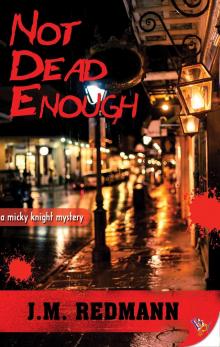 Not Dead Enough
Not Dead Enough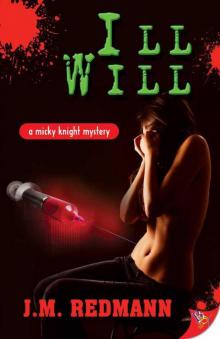 Ill Will
Ill Will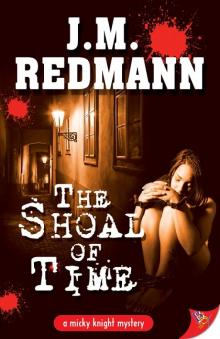 The Shoal of Time
The Shoal of Time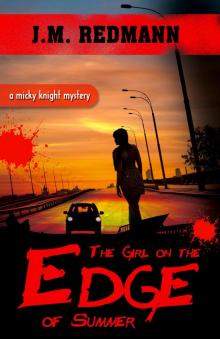 The Girl on the Edge of Summer
The Girl on the Edge of Summer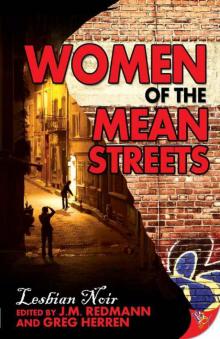 Women of the Mean Streets
Women of the Mean Streets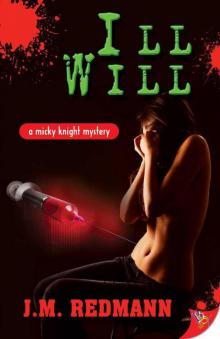 J.M. Redmann - Micky Knight Mystery 7 - I'll Will
J.M. Redmann - Micky Knight Mystery 7 - I'll Will